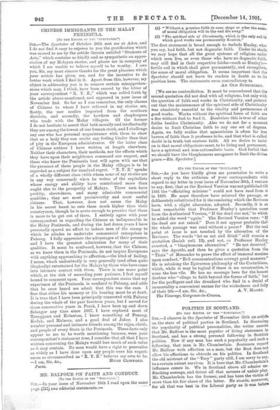MR. BALFOUR, ON FAITH AND CONDUCT.
rlo THE EDITOR OP THE 44 SPECTATOD."1 SIR,—In your issue of November 16th I read upon the same rage (757) two editorial statements:— (1) "Without a g•-nnine faith in some shape or other the sense of moral obligation will in the end die away."
(2) "The spiritual side of Christianity, which is the only soil in which good works can permanently flourish."
The first statement is broad enough to include Huxley, who' you say, had faith, but not dogmatic faith. Under its sha.de. we may hope that all the great systems of religions under which men live, or even those who have no dogmatic faith, may still find in their respective faiths—such as Huxley'a-:.. fertile soil in which shall grow permanently, and strengthen, the sense of moral obligation. It seems important that the Spectator should not leave its readers in doubt as to its position here. The statements seem contradictory to AN OLD SUBSCRIBER.
[We see no contradiction. It must be remembered that the second quotation did not deal with all religions, but only with the question of faith and works in Christianity, and pointed out that the maintenance of the spiritual side of Christianity was absolutely essential to the vitality and permanence of good works. Works without the spiritual force of faith are a fire without fuel to feed it. Doubtless this is true of other faiths besides Christianity. Also we do not for a moment desire to limit Christian faith to any one set of dogmas. Again, we fully realise that agnosticism is often far less barren of faith than it professes to be, and that what is called doubt is.in truth but anxious faith. All we desire to insist on is that moral obligations must, to be living and permanent, have a spiritual and non-rationalistic basis. God forbid that we should have the blasphemous arrogance to limit the divine grace.—En. Spectator.1














































 Previous page
Previous page